Daily Vocabulary Words: List of Daily Used Words in Leading International Newspapers
Hi there. Welcome to this special section @ Wordpandit.
Our endeavour here is very simple: to highlight important daily vocabulary words, which you would come across in leading newspapers in the country. We have included the following newspapers in our selection:
• The New York Times
• The Washington Post
• Scientific American
• BBC
• The Guardian
• Psychology Today
• Wall Street Journal
• The Economist
We are putting in extensive work for developing your vocabulary. All you have got to do is be regular with this section and check out this post on a daily basis. This is your repository of words that are commonly used and essentially, we are posting a list of daily used words. Hence, this has significant practical application as it teaches you words that are used commonly in leading publications mentioned above.
Visit the website daily to learn words from leading international newspapers.
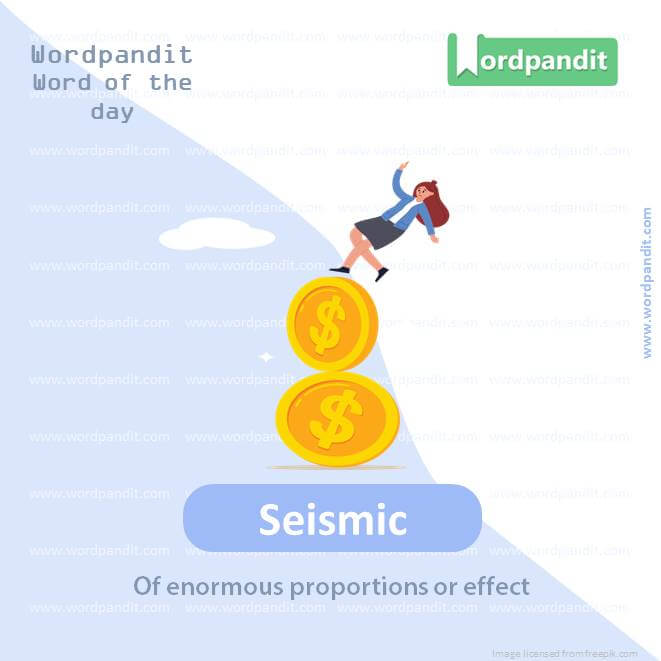
WORD-1: Seismic
Explanatory Paragraph: Think of the ground shaking during an earthquake; that’s seismic. It’s like when something big and powerful happens and makes everything shake or change a lot.
Meaning: Of enormous proportions or effect
Pronunciation: size mik
Synonyms: earthshaking, tremorous, quake related, tectonic, vibratory
Usage Examples:
1. The city experienced a seismic event last night.
2. Seismic activity was recorded near the volcano.
3. The discovery was of seismic importance in the field of science.
4. Engineers study seismic data to build safer buildings.
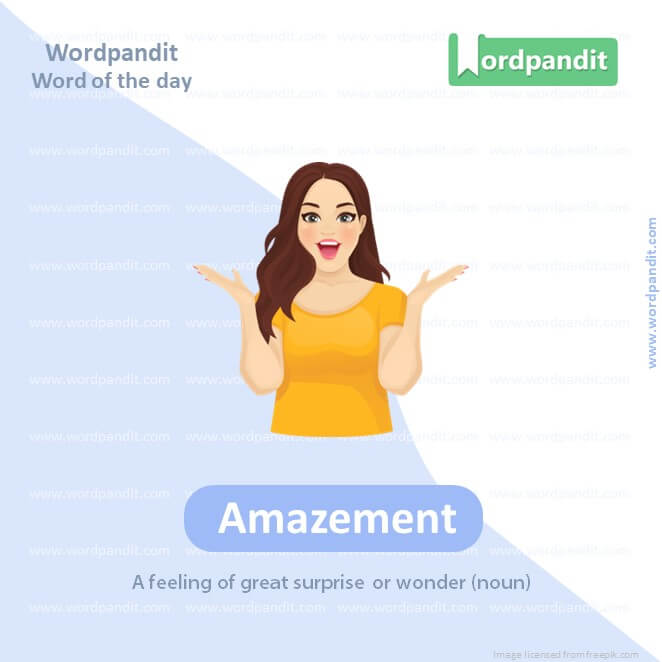
WORD-2: Amazement
Explanatory Paragraph: Amazement is the feeling you get when you see something really surprising or wonderful, like when a magician pulls a rabbit out of a hat.
Meaning: A feeling of great surprise or wonder (noun).
Pronunciation: uh mayz muhnt
Synonyms: astonishment, wonder, awe, surprise, stupefaction
Usage Examples:
1. She watched the fireworks in amazement.
2. The magician’s trick filled the audience with amazement.
3. He stared in amazement at the tall skyscrapers.
4. Her talent for singing caused amazement among the judges.
WORD-3: Effervescent
Explanatory Paragraph: Imagine a fizzy drink with bubbles going up quickly; effervescent is like that. It means lively and full of energy or excitement, like the bubbles in your soda.
Meaning: Vivacious and enthusiastic, or giving off bubbles (adjective).
Pronunciation: ef er ves uhnt
Synonyms: bubbly, fizzy, vivacious, lively, sparkling, exuberant
Usage Examples:
1. Her effervescent personality made her popular at school.
2. The effervescent drink popped and fizzed when opened.
3. He gave an effervescent performance on stage.
4. The party was filled with effervescent laughter and joy.
WORD-4: Inquisition
Explanatory Paragraph: Inquisition is like a very serious and long questioning session, where someone keeps asking many questions to find out the truth, like when your mom asks you lots of questions to find out who broke the vase.
Meaning: A period of prolonged and intensive questioning or investigation (noun).
Pronunciation: in kwuh zish uhn
Synonyms: interrogation, probing, examination, inquiry, investigation
Usage Examples:
1. The lawyer’s inquisition made the witness nervous.
2. During the inquisition, many historical documents were examined.
3. The scientist underwent an inquisition by the review board.
4. The novel depicted a dark period of religious inquisition.
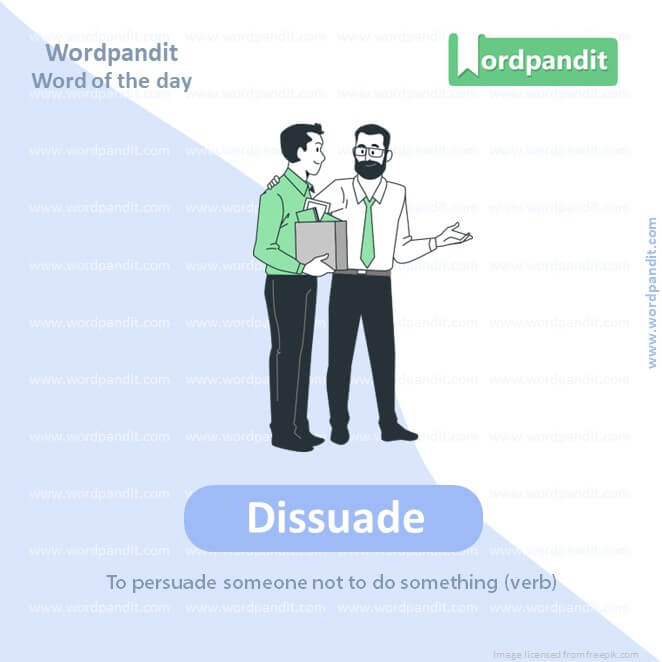
WORD-5: Dissuade
Explanatory Paragraph: Dissuade is when someone tries to convince you not to do something, like when your friend tells you not to touch a hot stove because it will burn.
Meaning: To persuade someone not to do something (verb)
Pronunciation: di swayd
Synonyms: discourage, deter, prevent, talk out of, convince against
Usage Examples:
1. His parents tried to dissuade him from dropping out of school.
2. She dissuaded her friend from making a hasty decision.
3. The bad weather dissuaded them from going on a hike.
4. The high costs dissuaded her from buying the luxury car.
WORD-6: Stumbling
Explanatory Paragraph: Stumbling is like when you trip or almost fall while walking, like if you don’t see a toy on the floor and your foot hits it, making you wobble.
Meaning: Tripping or losing one’s balance while walking or running (verb).
Pronunciation: stum bling
Synonyms: tripping, faltering, bumbling, tottering, lurching
Usage Examples:
1. He was stumbling in the dark, trying to find the light switch.
2. Stumbling over her words, she nervously gave her speech.
3. The uneven pavement caused many pedestrians to stumble.
4. After stumbling, he regained his balance and continued to run.
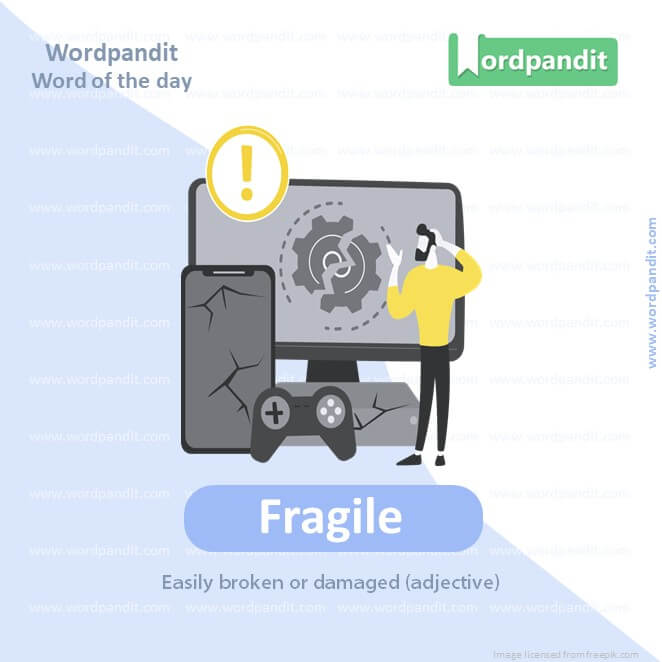
WORD-7: Fragile
Explanatory Paragraph: Fragile is when something is very easy to break, like a thin glass or a delicate flower that can get hurt or damaged very easily.
Meaning: Easily broken or damaged (adjective)
Pronunciation: ef er ves uhnt
Synonyms: bubbly, fizzy, vivacious, lively, sparkling
Usage Examples:
1. She had an effervescent personality that lit up the room.
2. The effervescent drink popped and fizzed when opened.
3. His effervescent enthusiasm for the project was contagious.
4. The party had an effervescent atmosphere with everyone dancing and laughing.
WORD-8: Detention
Explanatory Paragraph: Detention is like when you have to stay in a room at school after everyone else goes home because the teacher wants you to think about something you did wrong.
Meaning: The act of keeping someone in a place, especially a classroom, as a punishment (noun).
Pronunciation: de ten shuhn
Synonyms: custody, confinement, imprisonment, captivity, holding
Usage Examples:
1. He got detention for breaking the school rules.
2. During detention, students had to sit quietly and think about their actions.
3. She was in detention for being late to class too often.
4. The detention center was used to hold suspects.
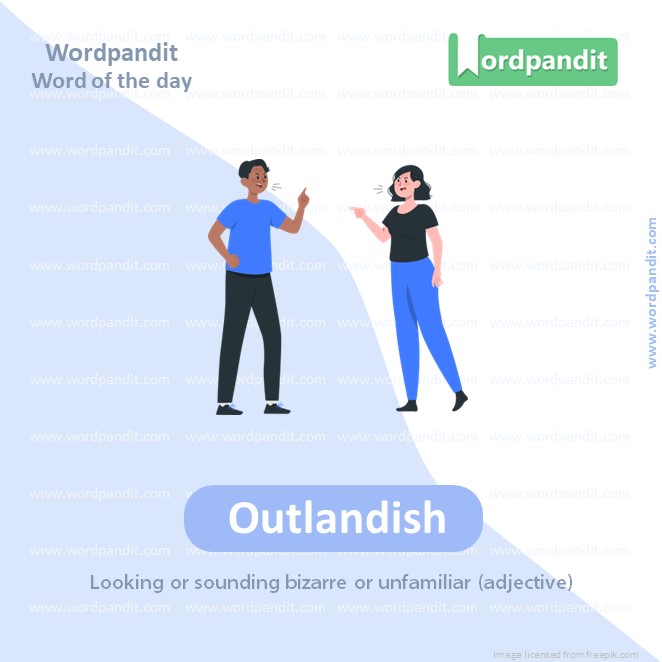
WORD-9: Outlandish
Explanatory Paragraph: Outlandish is like something that looks or sounds really strange and different, kind of like a purple polka dotted alien from a cartoon. It’s not what you normally see or hear.
Meaning: Looking or sounding bizarre or unfamiliar (adjective)
Pronunciation: out lan dish
Synonyms: bizarre, strange, weird, peculiar, eccentric
Usage Examples:
1. He wore an outlandish outfit to the party.
2. The idea seemed outlandish at first, but it worked.
3. Her outlandish tales entertained everyone at the gathering.
4. The movie’s plot was too outlandish to be believable.
WORD-10: Conflating
Explanatory Paragraph: Conflating is like mixing up two different things as if they are the same, such as thinking a tomato is the same as an apple just because they are both red.
Meaning: Combining two or more ideas, texts, etc., into one, often mistakenly or without proper distinction (verb).
Pronunciation: kuhn-flay-ting
Synonyms: blending, merging, fusing, mixing, amalgamating
Usage Examples:
1. He was conflating her kindness with romantic interest.
2. The report was flawed because it conflated unrelated data.
3. Conflating fact and fiction can lead to misunderstandings.
4. The discussion was confusing because it kept conflating different issues.
Vocabulary In English
Dancing within the vibrant scheme of language learning, a profound understanding of ‘vocabulary in English’ is indispensable. These sets of words, serving as the pillars of communication, lay the foundation for effective and fluent exchange of ideas. Yet the question begs, how should one go about mastering ‘vocabulary in English’?
Embracing ‘vocabulary in English’ demands a well-rounded understanding, far more than mere surface memorization. It is of immense benefit to explore a variety of reading materials, such as books, newspapers, magazines, and online content. This broad exposure yields a practical understanding of how and when words are used, thereby enriching your command over ‘vocabulary in English’.
To aid the learning of ‘vocabulary in English’, memory-enhancement techniques come to the rescue. Regularly using flashcards, or applications that reinforce the principles of spaced repetition, can drastically improve memory retention. Aiding this, the use of mnemonic devices to associate words with unique stories or images in your mind has shown to greatly assist recall.
Practical application further paves the way for mastering ‘vocabulary in English’. By using the learnt words actively in your daily conversations, you cement their grasp in memory and understand their practical usage.
Rounding off, regular reviews of ‘vocabulary in English’ is the secret ingredient in the recipe for success. Consistent revision sessions solidify the retention of previously learned words and maintain a fresh connection with them.
To conclude, the path to mastering ‘vocabulary in English’ is an insightful journey, made enjoyable with diverse resources, effective memory techniques, practical usage, and regular review sessions. As you immerse into this linguistic voyage, every word you learn brews a unique tale, enhancing the narrative of your language proficiency and guiding you towards becoming a skilled communicator.







